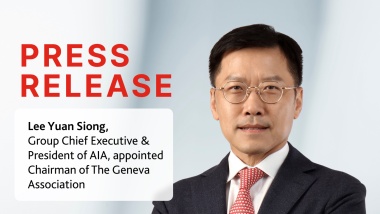ZURICH, 15 October 2021 – The Geneva Association and the Organisation for Economic Cooperation and Development (OECD) co-hosted a high-level conference on 12 October 2021, Future-Proofing Technological Innovations for a Resilient Net-Zero Economy, with the aim of providing input for the discussions that will take place at COP26 in Glasgow in November.
The strategic, multi-stakeholder conversation brought together CEOs and senior officials from the insurance industry, financial sector, engineering community, government, United Nations, OECD, World Economic Forum, and World Business Council for Sustainable Development.
An unprecedented transformation across society and economic sectors is needed to achieve ambitious net-zero targets over the next few decades. Expanding and deploying technological innovations will be critical. “The confluence of post-pandemic reconstruction, the climate crisis and social imbalances from technology and globalisation, is a historic opportunity for shaping a technological and institutional revolution that can unleash a smart, green and fair golden age for all,” said Professor Carlota Perez, world-renowned expert on technological revolutions.
There are myriad risks associated with the deployment of untested technologies. As the world’s risk managers and a significant source of investment capital, the role of insurers will be essential to scaling up technological solutions. Jeffrey Schlagenhauf, Deputy Secretary-General of the OECD, said “The successful transition to a net-zero economy will require a complete transformation of the technologies used across all sectors of the economy. Insurance regulators and supervisors have a critical role to play in creating an enabling environment that facilitates insurance companies’ capacity to support this transition as underwriters, risk managers, and providers of the needed capital investment.”
The discussion focused on the technological innovations necessary to accelerate decarbonisation and achieve climate targets and the key role of the insurance industry in supporting those innovations. Charles Brindamour, CEO of Intact Financial and Chairman of The Geneva Association, said: “Insurers play a key role in enabling innovation and prosperity in all areas of the economy. We can be a key agent in de-risking the transition towards a sustainable future, by leveraging our strengths and expertise in data analytics, pricing, risk management and prevention. Governments also have a powerful role to play. They can send strong signals by establishing a focused agenda, setting consistent climate priorities and supplying new capital to accelerate clean tech growth.”
Patricia Espinosa, Executive Secretary of the United Nations Framework Convention on Climate Change (UNFCCC) referred in her keynote statement to decarbonisation and achieving net zero as the most significant economic transformation in our history, and called for the insurance industry to redirect underwriting and investments to decarbonise the economy in alignment with the Paris Agreement.
Maryam Golnaraghi, Director Climate Change and Environment at The Geneva Association, stressed: “The role of insurers in assessing, pricing and managing the untested risks associated with new technologies and processes will be fundamental for large-scale implementation and raising private capital. This conference is the launch point for The Geneva Association’s exciting new research initiative on ‘innovating insurance solutions for de-risking climate technologies towards net zero’.










